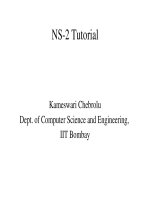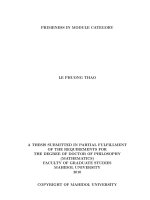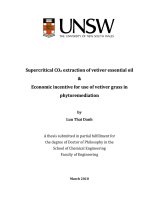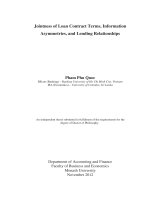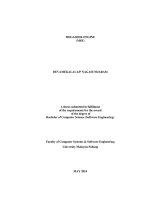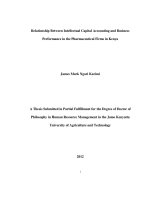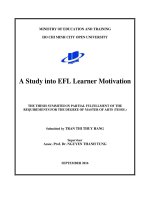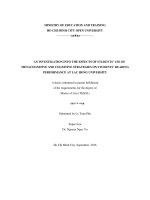A thesis submitted in fulfilment of the requirements for the award of the degree of Bachelor of Computer Science (Software Engineering)
Bạn đang xem bản rút gọn của tài liệu. Xem và tải ngay bản đầy đủ của tài liệu tại đây (2.06 MB, 24 trang )
i
MEGASEEK ENGINE
(MSE)
DEVAMEKALAI A/P NAGASUNDARAM
A thesis submitted in fulfilment
of the requirements for the award
of the degree of
Bachelor of Computer Science (Software Engineering)
Faculty of Computer Systems & Software Engineering
University Malaysia Pahang
MAY 2014
v
Abstract
FSKKP is using manual Thesis Management System which considered as not efficient
to save the entire data of thesis. Thesis can lost easily when manual filing system is
used. The current system does not have any secure implementation in order to control
this situation. Any unexpected disaster can destroy all the data saved via filing system.
Furthermore users have to face difficulties to get access to thesis via manual system as
they have to search manually the entire filing system to get a thesis. MegaSeek Engine
(MSE) is an information management system which designed for manage thesis of
FSKKP final year students. The main objective of this project is to engage all parties in
one collaborative online system systematically as a medium in exchanging information
for Final Year Project thesis. The entire final year student who finishes their final year
project will be able to upload their thesis in this system. This will help the faculty to
keep track of final year project title each and every year. PHP, Javascript and HTML
language will be used to develop this system and Xampp Server will be used for
database as well. Thus this system will help to enhance and standardize FSKKP’s thesis
management.
vi
Abstrak
FSKKP menggunakan Sistem Pengurusan Tesis manual yang dianggap sebagai
tidak cekap untuk menyimpan keseluruhan data tesis. Tesis boleh hilang dengan mudah
apabila sistem pemfailan manual digunakan. Sistem sekarang tidak mempunyai apa-apa
pelaksanaan yang boleh mengawal keadaan ini. Apa-apa bencana yang tidak dijangka
boleh memusnahkan semua data yang disimpan melalui sistem pemfailan. Tambahan
pula pengguna terpaksa menghadapi kesukaran untuk mendapatkan akses kepada tesis
melalui sistem manual kerana mereka perlu mencari secara manual sistem pemfailan
keseluruhan untuk mendapatkan tesis. MegaSeek Enjin (MSE) adalah satu sistem
pengurusan maklumat yang direka untuk menguruskan tesis FSKKP pelajar tahun akhir .
Objektif utama projek ini adalah untuk melibatkan semua pihak dalam satu sistem dalam
talian secara sistematik sebagai medium untuk bertukar-tukar maklumat untuk tesis.
Seluruh pelajar tahun akhir yang selesai projek tahun akhir akan dapat memuat naik tesis
mereka dalam sistem ini. Ini akan membantu fakulti untuk mengesan tajuk projek tahun
akhir setiap tahun . PHP , Javascript dan HTML akan digunakan untuk membangunkan
sistem ini dan Server Xampp akan digunakan untuk pangkalan data juga. Oleh itu,
sistem ini akan membantu untuk meningkatkan dan menyeragamkan pengurusan tesis
FSKKP ini .
vii
TABLE OF CONTENTS
CHAPTER
1
2
TITLE
PAGE
TITLE PAGE
i
DECLARATION
ii
DEDICATION
iii
ACKNOWLEDGEMENT
iv
ABSTRACT
v
ABSTRAK
vi
TABLE OF CONTENT
vii
LIST OF FIGURES
xii
LIST OF TABLES
xv
LIST OF APPENDIXES
xvi
INTRODUCTION
1.1 Introduction
1
1.2 Problem Statement
3
1.3 Objective
3
1.4 Scope
4
1.5 Organization Of Thesis
5
LITERATURE REVIEW
2.1 Introduction
7
2.2 Existing System
9
2.2.1 Manual System
9
viii
2.2.2 Science Direct
9
2.2.3 E-Journal of Public Affairs
12
2.3 Scripting Language
14
2.3.1 Hypertext Preprocessor (PHP)
14
2.3.2 HTML
15
2.3.3 Programming C
16
2.3.4 Java Script
16
2.3.5 Comparison between Programming Languages
17
2.4 Technique
18
2.4.1 Mobile Application
18
2.4.2 Web Application
20
2.4.3 Comparison between web application and mobile
21
Application
2.5 Database
2.5.1 Structured Query Language(SQL)
22
2.5.2 MySQL Database
24
2.5.3 Microsoft SQL Server
25
2.5.4 Difference between MySQL and MS
26
SQL Server
2.6 Web Server
28
2.6.1 Apache
28
2.6.2 Xampp
28
2.7 Software Development Methodology
29
2.7.1 Waterfall Model
29
2.7.2 Agile Model
33
ix
2.7.3 Summary of Software Process Model
3
36
METHODOLOGY
3.1 Project Methodology (Rapid Application
37
Development)
3.2 RAD Process
3.2.1 Analysis
4
40
40
3.2.1.1 User Requirement
41
3.2.1.2 System Requirement
41
3.2.2 Design
42
3.2.3 Construction Phase
49
3.2.4 Testing
50
3.2.5 Implementation
51
3.3 Justification of Methodology
52
3.4 General Requirement
53
3.4.1 Hardware requirement
53
3.4.2 Software requirement
54
IMPLEMENTATION
4.1 Introduction
56
4.2 Database Architecture
57
4.2.1 MSE Database
57
4.2.2 Tables
58
4.2.2.1 User Table
58
4.2.2.2 Staff Table
59
4.2.2.3 Admin Table
59
x
5
4.2.2.4 File Table
60
4.2.2.5 My_folder Table
60
4.4.3 Database connection
61
4.3 MSE Interfaces & Coding
62
4.3.1 Homepage Interface & Login Coding
63
4.3.2 Update Profile
65
4.3.3 Upload Thesis
67
4.3.4 Update Thesis
69
4.3.5 Search Thesis
72
4.3.6 View Thesis
75
4.3.7 Download Thesis
76
4.3.8 Notify Supervisor
77
4.3.8.1 SMS Notification
77
4.3.8.2 Email Notification
78
4.3.9 Add Favorite
81
4.3.10 Change Password
83
4.3.11 Approve Thesis
84
4.3.12 Manage Student
86
4.3.13 Manage Staff
87
4.3.14 Manage Admin
88
4.3.15 Manage Thesis
89
4.3.16 Register User
90
4.4 Use Case Diagram of MSE
91
4.5 Flow Chart Of MSE Process
92
RESULT AND DISCUSSION
5.1 Introduction
96
xi
5.2 Result Analysis
5.2.1 To develop a web based prototype of
97
97
MegaSeek Engine for FSKKP final year students.
5.2.2 To manage the thesis in a standardize system
101
with more security
5.2.3 To provide students and lecturers with proper
101
and easier access to thesis
6
5.3 Result of the System
101
5.4 User Acceptance Test
103
5.5 Assumptions
110
5.6 Constraits
111
5.7 Sugestion And Futere Disscusion Of The System
111
CONCLUSION
6.1 Conclusion
112
xii
LIST OF FIGURES
FIGURE NO
Title
PAGE
2.1
Main Page Of Science direct Website
7
2.2
Detailed Page Of Science direct Website
8
2.3
Detailed Page Of Ejournal Of Public Affairs Web
9
2.4
Waterfall Model
9
2.5
Agile Methodology Process
10
3.1
Rapid Application Development (RAD) Model
10
3.2
Flow Chart Of Student
13
3.3
Flow Chart Of Admin
14
3.4
Flow Chart Of Lecturer
15
3.5
Flow Chart Of Researcher
16
3.6
Use Case Diagram Of MegaSeek Engine (MSE)
17
4.1
MSE Database Architecture And List Of Tables
18
4.2
User Table
32
4.3
Staff Table
37
4.4
Admin Table
38
4.5
File Table
38
4.6
My_folder Table
39
4.7
Coding To Integrate PHP System With Xampp
40
4.8
Homepage Interface
40
4.9
Login Coding
41
4.10
Interface For User Update Profile Main Page
41
4.11
Interface For User Update Information
41
4.12
Coding For Update User Profile
42
4.13
Interface For Upload Thesis Page
42
4.14
Interface For Feedback Page After Upload
49
4.15
Coding For Uploading File
50
4.16
Interface For Update Thesis Page
51
xiii
4.17
Interface For Updating Thesis Information Page
51
4.18
Coding For Update Thesis
52
4.19
Interface For Search Thesis Page
52
4.20
Interface For Result For Search Thesis
53
4.21
Interface For View Thesis
53
4.22
Interface For Download Thesis
54
4.23
Coding For Download File
54
4.24
Interface For Send SMS Notification
55
4.25
Coding For Send SMS Notification
59
4.26
Interface For Send Email Notification
60
4.27
Coding For Send Email To Notify Supervisor
61
4.28
Interface For Add Favorite Thesis Page
62
4.29
Interface To Show Favorite Thesis
63
4.30
Interface For Change Password Page
64
4.31
Interface For Staff To Approve Student Thesis
66
4.32
Interface To Select Thesis Status
66
4.33
Interface To Manage Student Detail
68
4.34
Interface To Manage Staff Detail
69
4.35
Interface To Manage Admin
70
4.36
Interface For Manage Thesis
70
4.37
Interface For Register User
71
4.38
Use Case Diagram Of Megaseek Engine (MSE)
71
4.39
Flow Chart Of Student
72
4.40
Flow Chart Of Admin
72
4.41
Flow Chart Of Lecturer
73
4.42
Flow Chart Of Researcher
74
5.1
Pie Chart For Question 1
75
5.2
Pie Chart For Question 2
79
5.3
Pie Chart For Question 3
80
5.4
Pie Chart For Question 4
81
xiv
5.5
Pie Chart For Question 5
82
5.6
Pie Chart For Question 6
83
5.7
Pie Chart For Question 7
84
xv
LIST OF TABLES
TABLE NO
TITLE
PAGE
2.1
Comparison between Programming Languages
11
2.2
Comparison between web application and mobile
14
application
2.3
Difference between MySQL and MS SQL Server
18
2.4
Comparison of methods
26
3.1
Hardware Requirement to develop MegaSeek
31
Engine (MSE)
3.2
Software Requirement to develop MegaSeek
Engine (MSE)
32
xvi
LIST OF APPENDIXES
APPENDIX
TITLE
PAGE
A
Gantt Chart
94
B
User Acceptance Questionnaire
96
1
CHAPTER 1
INTRODUCTION
1.1 Introduction
Information Management System (IMS) is a joint hierarchical database and
information management system with extensive transaction processing capabilities. [1] IBM
designed IMS with Rockwell and Caterpillar starting in 1966 for the Apollo program. IMS's
challenge was to inventory the very large bill of materials (BOM) for the Saturn V moon
rocket and Apollo space vehicle. However, by some accounts it was accepted too late in the
process to make significant contributions to the Apollo program. [2]
The IMS Database component stores data using a hierarchical model.[3] IMS can be
applied to any system of software that facilitates the storage, organization, and retrieval of
information within a computer system, without the implication that it need have all the
2
essential characteristics of a DBMS. The information held may include sound fragments,
images, and video sequences in addition to the usual textual and numerical information. [4]
Currently FSKKP is using manual Thesis Management System. It is considered as
not efficient to save the entire data of thesis. This is because thesis can lost easily when
manual filing system is used. The current system does not have any secure implementation
in order to control this situation. Any unexpected disaster can destroy all the data saved via
filing system. Furthermore users have to face difficulties to get access to thesis via manual
system. They have to search manually the entire filing system to get thesis. This is very time
consuming job.
MegaSeek Engine (MSE) is an information management system which designed for
manage thesis of FSKKP final year students. This Web-based system will emerge the
paradigm of University Malaysia Pahang thesis management. The manual system is messy
and time consuming with lack in efficiency. The main objective of this project is to engage
all parties in one collaborative online system systematically as a medium in exchanging
information for Final Year Project thesis.
The entire final year student who finishes their final year project will be able to upload
their thesis in this system. This will help the faculty to keep track of final year project title
each and every year. External user also can have access to this system to view the overview
of final year project titles of students.
3
1.2 Problem Statement
Problem statements are list why there is the need of developing MegaSeek Engine
(MSE). This does also mean that the existing management style is less efficient. Problem that
arise in the old management style are:
i.
There is no proper thesis management system for FSKKP.
ii.
Manual filing system is out-dated and less secure.
iii.
No proper access to thesis.
1.3 Objective
Objective are what will the new system have that will overcome constraints and problems
in the old management system. It will be the goal for designing MegaSeek Engine (MSE).
The objectives are:
i.
To develop a web based prototype of MegaSeek Engine (MSE) for FSKKP
final year students.
ii.
To manage the thesis in a standardize system with more security.
iii.
To provide students and lecturers with proper and easier access to thesis.
4
1.4 Scope
Scope is the range for the system. Scope that this document highlights is the user of
the system, and project boundaries of MegaSeek Engine (MSE). The scopes are:
i)
ii)
Project boundaries are:
a)
Create a website to manage FSKKP of final year project thesis.
b)
Student able to upload and download thesis information and abstract
from site.
c)
User friendly interface for website.
Target users for the system are:
a)
Student
b)
Lecturers
c)
Researchers
d)
Admin
5
1.5 Thesis Organization
This thesis consists of five (6) chapters:
Chapter 1: Introduction
The purpose of this chapter is to introduce to the readers about the project that will be
developed later. This chapter contains introduction, problem statement, objective, and scope
and thesis organization.
Chapter 2: Literature review
This chapter explains about the reviews for the chosen project. This chapter is divided into
two sub reviews that require students to study to get complete information about the project.
Chapter 3: Methodology
This chapter discusses the approach and framework for the project. Method, technique or
approach that will be and will be used while designing and implementing the project will be
included in the content. Justification and of method on approach used and hardware and
software necessary is stated here.
Chapter 4: Implementation
This chapter acts to document all processes that involve in the development of the project.
Designed project development is explained here. The content of this project depends on the
system. It contains information of database and tools used. Data in database is shown in this
chapter.
6
Chapter 5: Results and Discussion
The purpose of this system is to explain about the results and data analysis that had been
acquired. Result analysis, project limitation and suggestion and project enhancement are
contents for the chapter.
Chapter 6: Conclusion
This chapter explains briefly and summarizes the developed project.
7
CHAPTER 2
LITERATURE REVIEW
2.1
Introduction
This literature review indicates the research innovative and interesting exploration of
the research idea that related to the MegaSeek Engine (MSE). It is important element that
covers the relevant knowledge to help in project implementation. The literature review begins
with the project understanding, followed by comparison of existing system, software process
and models. Software Technique, tools and related framework will also be discuss.
References made from various resources such as books, conference paper, articles, journals,
internet and etc.
8
Previously there is no proper system to manage the student’s thesis information in
FSKKP. The program documentation and record has been compiled in spread sheet format
and not centralized. The information is not easily accessible either by the student or lecturer.
The records become difficult to manage after the program has been running for more than a
year.
Among the data that need to be managed properly are student thesis records, thesis
title and project specification. The systems will be sharing student record in the database
level. Additionally, the above services should be accessible by student and lecturer anytime
and anywhere without additional software to install on their computer. From this
requirement, the system should be built in web based environment. The details function of
the MegaSeek Engine (MSE) component will be further discussed.
9
2.2
Existing System
2.2.1 Manual System
Currently, there is manual thesis management system that exists in FSKKP. Some
faculties didn’t have any system to manage the thesis in a standardize system with more
security and provide students and lecturers with proper and easier access to thesis. In order
to manage the thesis, they use filing system which takes time. They have to arrange the entire
thesis in the rack. This is not standardized system and will take a long period to finish the
process. This may create some problem in the future. For example the missing of student
data, misplacing of the information and so on.
In order for the student or lecturers to get access to the system, they have to meet the
in charge person and get their permission to view the related thesis. Then student have to
wait few days for the approval. This makes students life harder.
2.2.2
Science Direct
ScienceDirect is a leading full-text scientific database offering journal articles and
book chapters from more than 2,500 journals and almost 20,000 books. [5] ScienceDirect is
website operated by the Anglo-Dutch publisher Elsevier containing (as of 2013) about 11
million articles from 2,500 journals and 6,000 e-books, reference works, book series and
handbooks. The articles are grouped in four main sections: Physical Sciences and
Engineering, Life Sciences, Health Sciences, and Social Sciences and Humanities. For most
articles on the website, abstracts are freely available; access to the full text of the article (in
10
PDF, and also HTML for newer publications) requires a subscription or pay-per-view
purchase. [6]
ScienceDirect is home to almost one-quarter of the world's peer-reviewed full-text
scientific, technical and medical content. Over 15 million researchers, health care
professionals, teachers, students and information professionals around the globe rely on
ScienceDirect as a trusted source of nearly 2,200 journals, almost 900 serials and close to
22,000 book titles. ScienceDirect supports research and education with interactive elements
in articles such as audio, video, graphs, tables and images, and offers tools so users can easily
set alerts. Content on ScienceDirect also features embedded links to external datasets,
including earth and environmental science data from PANGAEA, abstract and indexing data
from Scopus and chemical reactions data from Reaxys. With almost 12 million content pieces
available including pre-publication release of articles and open access content from Elsevier
journals. ScienceDirect is a premier platform for discovering the world of research. Articles
published in ScienceDirect Open Access journals are made permanently free for everyone to
access immediately upon publication. [7]
The drawback of this system must be registered by user and pay some amount in order
to get full version of data. But still it gives a lot of benefit to society.
11
Figure 2.1: Main page of ScienceDirect website.
Figure 2.2: Detailed page of ScienceDirect website.


